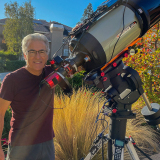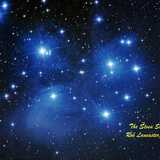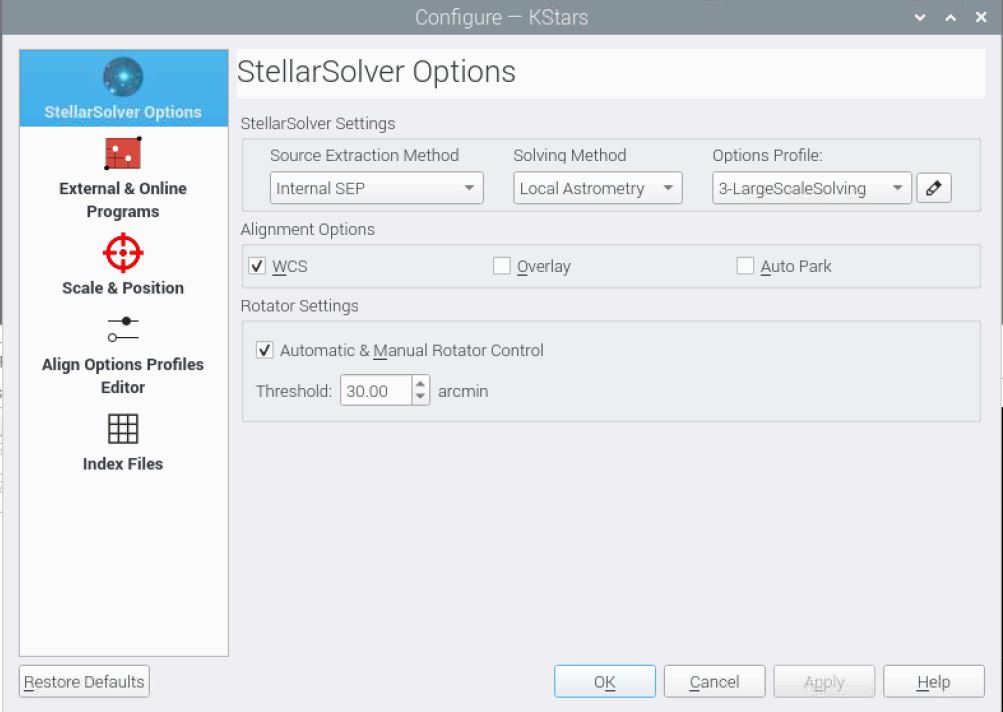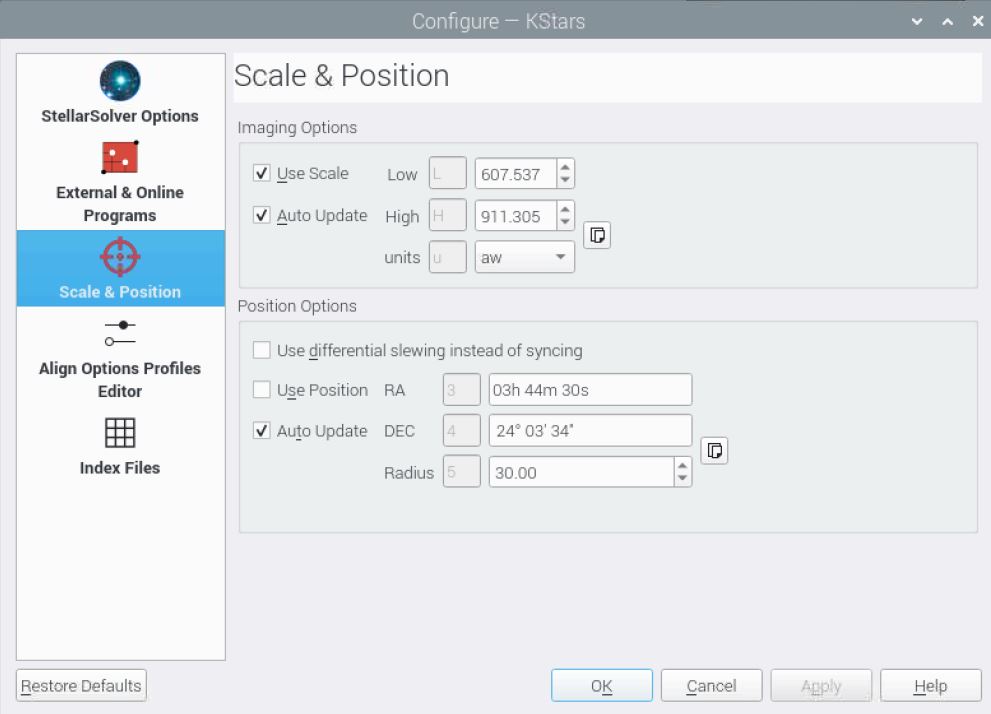INDI Library v2.0.7 is Released (01 Apr 2024)
Bi-monthly release with minor bug fixes and improvements
KStars/Ekos 3.6.0 Stable StellarSolver not running
Replied by Ben on topic KStars/Ekos 3.6.0 Stable StellarSolver not running
Interesting: The only difference between your and my settings is the flag "Use Scale" in the third screen. In my options, this flag is set. If I clear the flag, Kstars chrashes to desktop everytime when I load my fits-file. If I set the flag, it does not crash, but solves for ever...
I uploaded this fits-file to dropbox, I hope this link works:
www.dropbox.com/s/mpjpkqka3aqyf3b/Light_006.fits?dl=0
Maybe you want to try if you can solve that image by using "Load & Slew".
Please Log in or Create an account to join the conversation.
Replied by Avocette on topic KStars/Ekos 3.6.0 Stable StellarSolver not running
Please Log in or Create an account to join the conversation.
Replied by Ben on topic KStars/Ekos 3.6.0 Stable StellarSolver not running
Now I know that it makes no sense to reinstall astroberry or anything like that. The problem seems to be the fits-file itself or or the large scale of the combination of 135mm lens with full frame sensor!
Please Log in or Create an account to join the conversation.
Replied by Ben on topic KStars/Ekos 3.6.0 Stable StellarSolver not running
I am considering to use a local ASTAP or Astrometry installation instead of StellarSolver. Although StellarSolver should be based on Astrometry, solving my image on online Astrometry is no problem.
Please Log in or Create an account to join the conversation.
- Frederick Ruegsegger
-

- Offline
- Elite Member
-

- Posts: 211
- Thank you received: 30
Replied by Frederick Ruegsegger on topic KStars/Ekos 3.6.0 Stable StellarSolver not running
I thought I'd give the puzzle a try. I set up a simulator configuration with the specs for the Canon EOS 6D (I'm not a Canon shooter so apologies if I got some of this wrong). I originally set things up with the sensor specs for the Mark II assuming a 4x3 aspect ratio and the Solver solved the image. When I looked at the FITS header for the file you provided it appears that you are actually using the original 6D which has different pixel dimensions of course. When I input those specification, the solver failed each time. It never took longer than 30 to 60 seconds to fail - I didn't seem to have the problem of it running without stopping. I'm not sure what the INDI control panel shows for your camera but, based on your reported FOV, mine was pretty close (after I put in the 'correct' sensor data into the simulator) at 906.0' x 606.0'.
Can't explain why it seemed to work when I had the wrong sensor spec in the simulator. The solution the Solver achieved was very close to the information in the file's FITS header. I'm using 3.6.3 FWIW.
Good luck!
Please Log in or Create an account to join the conversation.
- Rob Lancaster
-

- Away
- Supernova Explorer
-

- Posts: 2879
- Thank you received: 813
Replied by Rob Lancaster on topic KStars/Ekos 3.6.0 Stable StellarSolver not running
The reason it fails to solve is because the position information in your file is way off. In your file it says the coordinates are:
RA 23:58:43
DEC 89:52:24.6
I did a blind solve (uncheck the "use position" option and it solved almost instantly. The coordinates are:
RA: 03:43:08.552
DEC: +23:59:15.135
Also note that I would have used my LargeScale option because the scale looks really large in your image, the solver agreed, it said:
942.405 x 630.679 arcminutes
But that being said, you did have a reasonable scale in the fits file. It said 7.9 - 11.99 arc seconds per pixel and the solver said it was actually 10.4" per pixel. So unchecking use scale would have had no effect, since the scale was fine.
So I would use the large scale solving option, and either correct your coordinates or uncheck "use position"
Thanks,
Rob
Please Log in or Create an account to join the conversation.
- Frederick Ruegsegger
-

- Offline
- Elite Member
-

- Posts: 211
- Thank you received: 30
Replied by Frederick Ruegsegger on topic KStars/Ekos 3.6.0 Stable StellarSolver not running
In a strange outcome, I selected "Use Position" again and Solver failed almost immediately. Then I again unselected "Use Position" and I got an answer right away.
Do you have any guidance on when to select "Use Position"? From the tool tip, it indicates that selecting it should speed up the solver although it seems to create some challenges of its own.
Thanks!
Please Log in or Create an account to join the conversation.
- Rob Lancaster
-

- Away
- Supernova Explorer
-

- Posts: 2879
- Thank you received: 813
Replied by Rob Lancaster on topic KStars/Ekos 3.6.0 Stable StellarSolver not running
If I had to take a guess based on the RA and DEC in the file you posted, what you may have done was that the scope thought it was pointing north, but then you moved it to the target without a slew command perhaps, so it thought was still pointing north but really it was not. This is just a guess. As a rule I turn on my mount in the home position, then I slew to a bright star, then I plate solve, then I go to my target and plate solve again.
Please Log in or Create an account to join the conversation.
Replied by Avocette on topic KStars/Ekos 3.6.0 Stable StellarSolver not running
Please Log in or Create an account to join the conversation.
Replied by Ben on topic KStars/Ekos 3.6.0 Stable StellarSolver not running
Unfortunately I cannot reproduce them, because KStars keeps crashing if I disable "Use Scale" or "Use Position". I think you found the problem in my file, but it seems that I have another problem with my installation. Are all of you running KStars 3.6.3? For me, 3.6.0 is the latest version it wants to upgrade to.
The reason for the wrong coordinates in the file is, that I made this image with a Star Adventurer setup without goto. So as you suggested I moved manually to this position while Kstars was pointing to another position.
Please Log in or Create an account to join the conversation.
Replied by Ben on topic KStars/Ekos 3.6.0 Stable StellarSolver not running
Please Log in or Create an account to join the conversation.
Replied by Ben on topic KStars/Ekos 3.6.0 Stable StellarSolver not running
Attachments:
Please Log in or Create an account to join the conversation.



